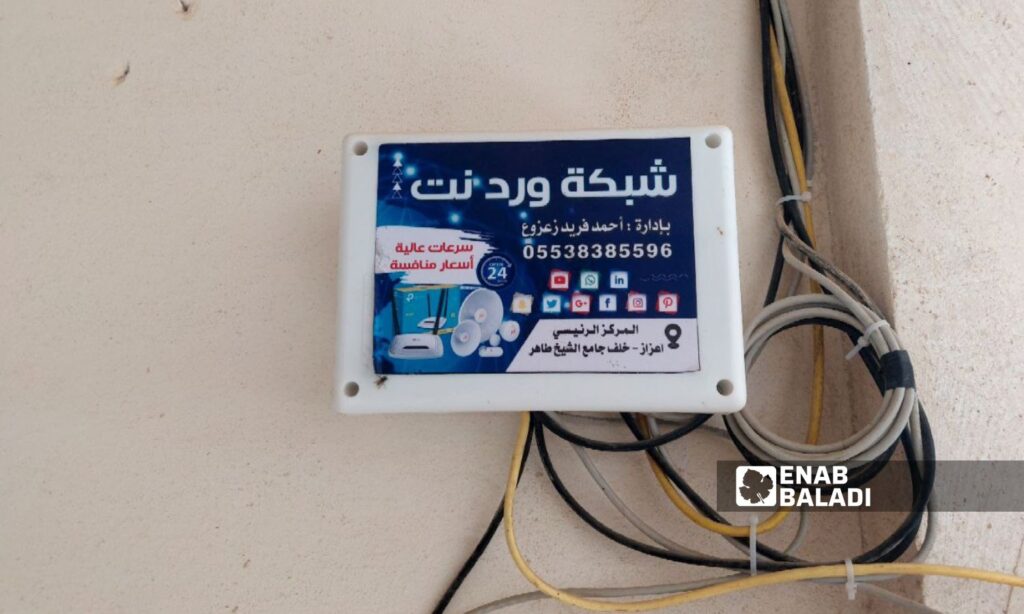Azaz – Dayan Junpaz
The city of Azaz, located in the northern Aleppo countryside, has witnessed a sudden increase in internet service prices exceeding 100%, according to a joint statement issued by internet service providers in the city.
The companies attributed the price hike to the increase in prices by network suppliers (the main source) during the past two months, as well as the rise in the exchange rate of the Turkish lira against the US dollar.
According to a statement issued by the companies on November 30, the monthly cost of the service has now reached $5 for 1 MB, $7 for 2 MB, $8 for 3 MB, and $10 for 5 MB.
The new pricing list took effect at the beginning of December, with the previous prices being $4 for 5.5 MB, $5 for 8.5 MB, and $5.5 for 10 MB.
The US dollar is currently trading at 29 Turkish lira, fluctuating between 28 and 29 lira during the past two months.
Price unification
Internet in the northern Aleppo countryside is provided through private investors and local companies in the absence of networks affiliated with government entities. These companies offer various services with different packages and prices, as well as varying internet quality.
Shadi al-Ward, the owner of Ward Net network in Azaz, told Enab Baladi that the prices of previous packages and subscriptions used to meet the needs of network owners, but they have now increased by 150% due to two main sources for wholesale internet packages.
He mentioned that internet packages are supplied by two main sources in the region, Tulip Line and Sham Future, and their price increase prompted other network owners to raise their prices to avoid any financial losses.
The network owner stated that the internet companies in the city have signed a comprehensive agreement to set and unify their service prices, and these modifications will be implemented starting from December.
Reduced speeds to mitigate costs
The new pricing list has led users in the city of Azaz to reduce internet speeds in order to adapt to the economic and financial situation.
Abdo Dermash from Azaz told Enab Baladi that he had increased his internet speed from 5 MB to 8 MB during the past months to avoid network congestion at home when using multiple devices.
He explained that he used to pay 140 Turkish lira for a 5 MB service, but with the recent price increase, the amount will reach 300 Turkish lira in a few days. This has prompted him to consider reducing his internet speed next month.
On the other hand, university student Ibrahim Rahal told Enab Baladi that the high cost of internet subscription burdens him and his housemates, adding to the expenses of studying, rent, household expenses, and more.
He added that he needs the internet for his studies and work, as he uses it continuously for long periods. He emphasized that the internet is not just an entertainment medium but has become a daily necessity.
Northwestern Syria is witnessing a deterioration in the economic situation, which adversely affects all aspects of life.
The general level of prices experiences frequent increases, affecting a range of basic goods, food items, and essential materials. This price hike makes it more difficult for the population to afford costs, forcing them to rely on multiple sources in an attempt to balance their income and expenses.
The minimum wage for public sector employees in the northern and eastern countryside of Aleppo is 1,140 Turkish lira for unmarried muezzins and sanitation workers, while it is 1,235 Turkish lira for married muezzins and sanitation workers. Meanwhile, a single teacher’s salary is 1,750 Turkish lira and 1,925 Turkish lira for married ones.
According to the Syrian Response Coordination Group (SRCG) operating in the region, the recognized poverty line has risen to 6,473 Turkish lira, while the extreme poverty line reached 4,669 Turkish lira.
A large number of people in northwestern Syria are experiencing extreme poverty, a decline in purchasing power, and a limited number of job opportunities.

